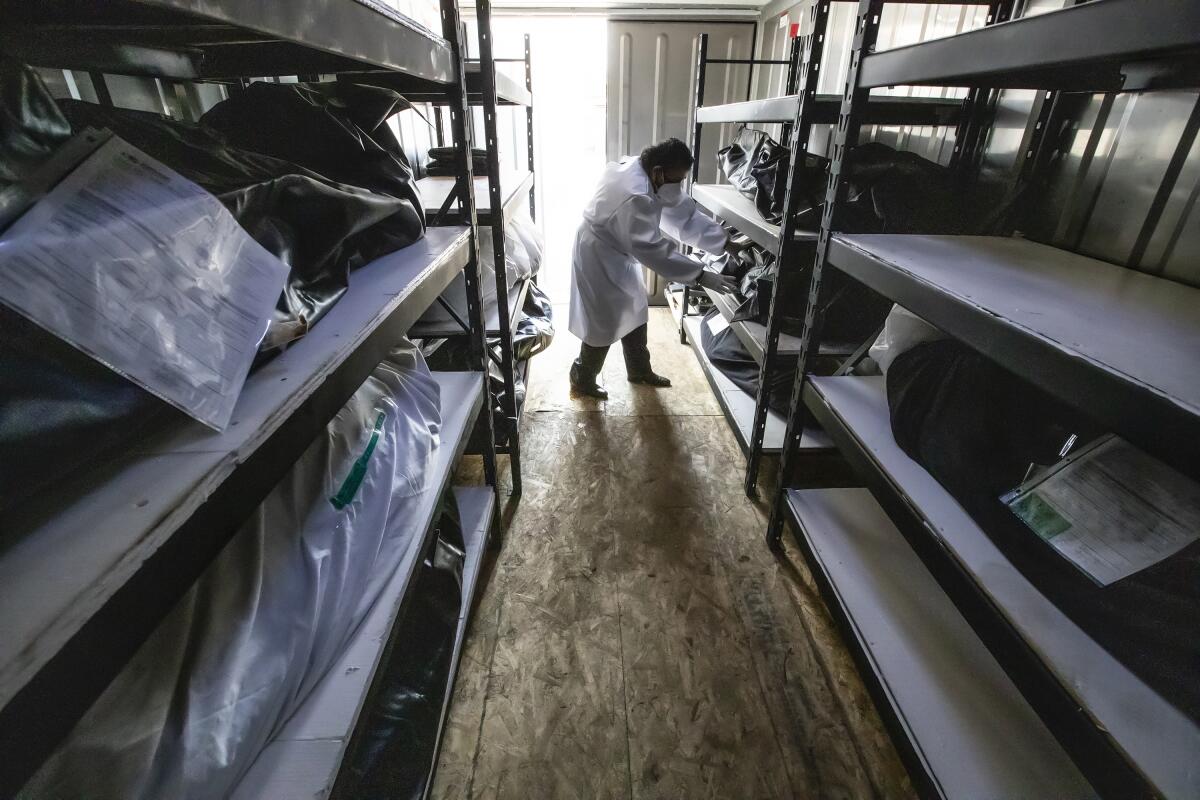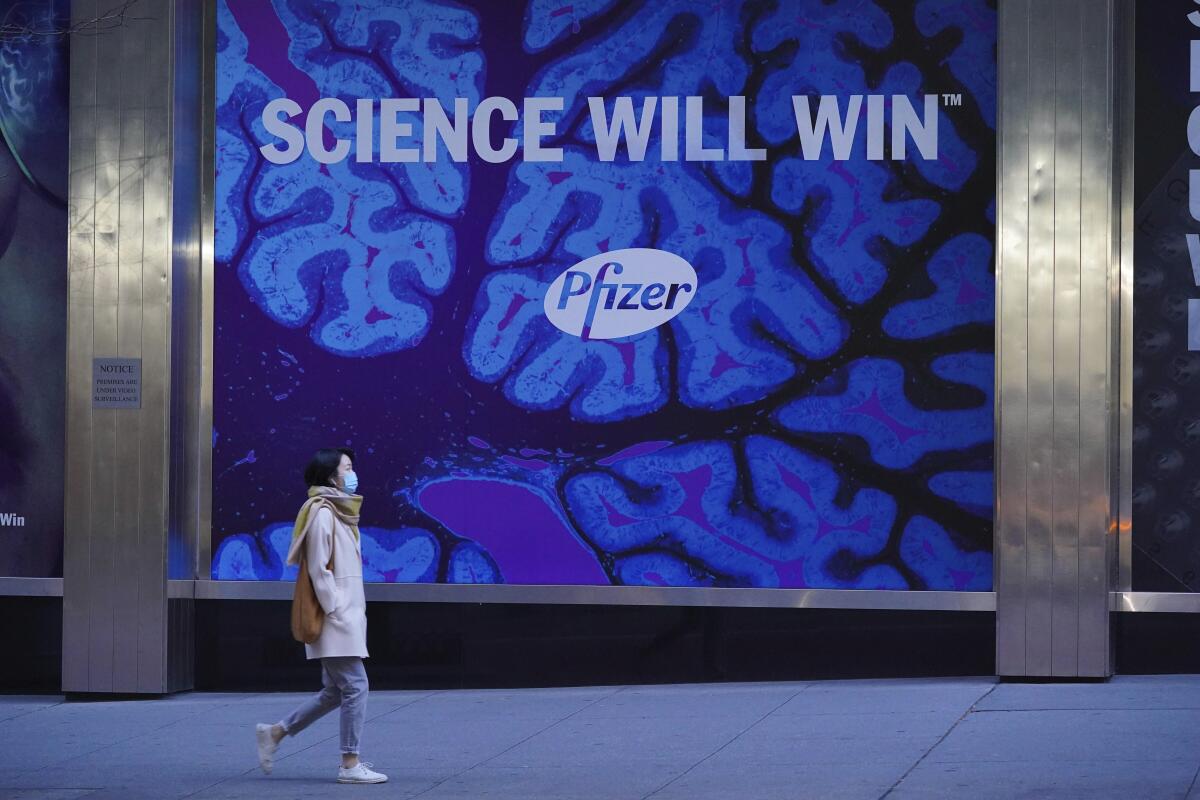2020 was the year that American science denial became lethal

It’s hard to pinpoint when the Republican Party’s long-cherished hostility to scientific facts went, shall we say, viral.
Was it when President Trump started promoting antimalarial pills as a treatment for COVID-19? Or when he mused openly about using bleach or bright light to kill the virus inside the body? Or when he became the standard-bearer for the notion that wearing masks was a sign of unmanly weakness and shunning them a test of conservative political faithfulness?
Was it when Republican senators and members of Congress bought into Trump’s assertion that the deadliness of COVID-19 had been exaggerated — people such as Sen. John Kennedy (R-La.), whose own state’s death rate from the pandemic outpaced those of most other countries in the world?
Or when they chose to stand silently by as Trump systematically wrecked the credibility of U.S. agencies that were once the gold standard for the application of scientific expertise in the public interest, including the Centers for Disease Control and Prevention, the Food and Drug Administration and the Environmental Protection Agency?
As one can tell from this list, the problem isn’t that there’s a paucity of data points from which to choose, but a surfeit. Trump’s exploitation of science denialism as policy in and of itself — his and the GOP’s rejection of expertise in almost all its forms — has been on display from the very start of his administration. It has deep roots in American political strategy across the partisan spectrum, though especially on the right.
The Year in Review
What’s important about how this phenomenon unfolded in 2020 isn’t that it’s so widespread, but that it can be tied to the U.S. toll in illness and death from the pandemic.
In no developed country has the governmental response to the pandemic been so fragmented and leaderless as here. In none has the national government deliberately stepped away from managing the crisis or substituted rank partisanship for the sober assessment of scientific knowledge.
America’s political leadership has chosen to paint the evolution of that knowledge in the 10 months or so since the pandemic erupted to be evidence not of the scientific method as it should work, but of scientific bad faith.
Early in the pandemic, public health experts mapped out strategies that could have “crushed” the disease in a matter of months. That would have required a level of official coordination and public leadership that would hardly have been unprecedented in American history, given the nation’s record of organization and sacrifice in fighting the Great Depression and World War II or deploying the polio vaccine in the mid-1950s.
But this government wasn’t up to the task. Its failure to heed the science not only contributed to illness and death, but also to the disintegration of American economic strength. With a new pandemic relief package held up by the Republican-controlled Senate, U.S. economic growth is unsustainable — as evidenced by a rise in jobless claims during the last weeks of November.

Trump’s rejection of science comes out of what biologist Sean B. Carroll of the University of Maryland and the Howard Hughes Medical Institute calls “the denialist playbook.”
Among the “principal plays” in the handbook, Carroll writes, are “doubt the science,” “question scientists’ motives and integrity,” “magnify disagreements among scientists,” and “appeal to personal freedom.”
All those plays have been openly embraced by Trump and his enablers. He and others in the COVID skeptics’ camp, such as Dr. Mehmet Oz and entrepreneur Elon Musk, have substituted their own ostensibly scientific judgment for those of researchers who assembled empirical evidence, such as the ineffectiveness of antimalarials, that contradicted Trump’s claims.
Trump attacked the motives and integrity of medical doctors by asserting they made more money when they diagnosed a patient with COVID-19. That was a lie, aimed at undermining case statistics. He and minions such as South Dakota Gov. Kristi Noem treat mask mandates, which are widely accepted as sound public health measures, as infringements of personal freedom. Noem’s state has been among the national leaders in average daily cases and deaths per capita.

The political war on science does more than merely subvert trust in the scientific method; it stifles scientific debate. During the pandemic, the prospect that unorthodox theories or findings about the nature of the disease and the efficacy of public health initiatives might be misused by denialists has made it harder for those viewpoints to get published.
As a result, orthodox positions harden into dogmas, “which leave little room for uncertainty and nuance, [and] undermine public trust as various assertions prove wrong,” Scientific American observes.
Who usually gains from scientific denial? Almost always, the winners are special interests that profit from the old ways of doing things — the incumbents in our economy. Climate change denial — the gold standard of anti-science policymaking until the pandemic appeared — put money in the pockets of the oil and gas industry, which saw it could continue marketing its products with abandon as long as it could foment public doubts about their connection to global warming.
The profits from denying the scale of the COVID-19 pandemic are harder to identify. It may be that anti-science policy has become so ingrained in the GOP that downplaying the deadliness of the pandemic just came naturally. If Trump saw it as a way to evade responsibility for dealing with the crisis, that notion couldn’t survive contact with the reality of the toll.
President-elect Joe Biden has made clear that he will put science back in the center ring of government policymaking. But after four years — decades, in fact — of scientific denialism at the highest reaches of American government, doing so will require an immense effort. In the meantime, the consequences of the old way will stay with us, measured in deaths, families ruined, society itself rattled. Science is not only a window on the natural world, but also a source of stability for civilization. If 2020 didn’t prove that, nothing will.

More to Read
Inside the business of entertainment
The Wide Shot brings you news, analysis and insights on everything from streaming wars to production — and what it all means for the future.
You may occasionally receive promotional content from the Los Angeles Times.











